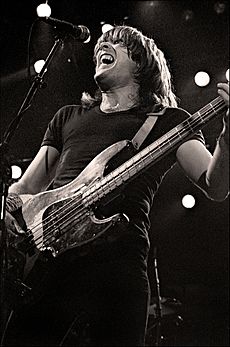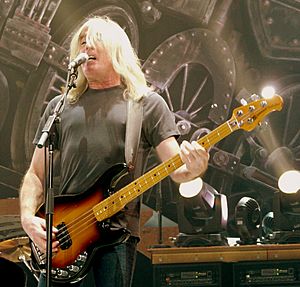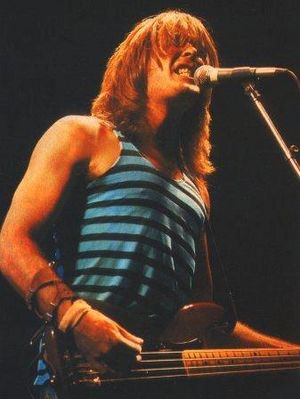Cliff Williams facts for kids
Quick facts for kids
Cliff Williams
|
|
|---|---|

Williams performing with AC/DC in 1982
|
|
| Background information | |
| Birth name | Clifford Williams |
| Born | 14 December 1949 Romford, Essex, England |
| Origin | Hoylake, Merseyside, England |
| Genres | |
| Occupation(s) |
|
| Instruments |
|
| Years active | 1966–2016, 2018–present |
| Labels | Columbia |
| Associated acts |
|
Clifford Williams (born December 14, 1949) is an English musician. He is best known as the bassist and backing singer for the famous Australian hard rock band AC/DC. Cliff started his music career in 1967. Before joining AC/DC, he played in English bands like Home and Bandit.
His first album with AC/DC was Powerage in 1978. In 2003, Cliff Williams was added to the American Rock and Roll Hall of Fame as a member of AC/DC. He announced he was leaving AC/DC in 2016. However, he returned for their 2020 album Power Up, along with bandmates Brian Johnson and Phil Rudd.
Contents
Early Life and Musical Beginnings
Clifford Williams was born in Romford, Essex, England, on December 14, 1949. In 1961, his family moved to Hoylake, Merseyside. There, he was inspired by the local "Merseybeat" music scene, which was popular at the time. This made him decide to become a musician.
When he was 13, Cliff and his friends formed a band. He was influenced by groups like The Rolling Stones, The Who, and The Kinks. He also liked blues musicians such as Bo Diddley. Cliff mostly learned to play bass by listening to records and figuring out the notes. He had only a few formal lessons from a professional bassist. He left school at 16 and worked as an engineer during the day while playing music at night.
Cliff Williams' Music Journey
Starting Out in London
In 1966, Cliff Williams moved to London. He worked different jobs, like at a demolition site and in supermarkets. At the same time, he played in several short-lived bands. He met guitarist Laurie Wisefield, and they formed a band called Sugar, which soon broke up.
In 1970, Cliff and Laurie joined with singer Mick Stubbs, keyboardist Clive John, and drummer Mick Cook. They formed a progressive rock group called Home. This band signed a deal with Epic Records and released their first album, Pause for a Hoarse Horse, in 1971. Home also opened for famous bands like Jeff Beck, Mott the Hoople, The Faces, and Led Zeppelin.
In 1972, Home released a self-titled album. It included their only hit song, "Dreamer." Their next album, The Alchemist, came out in 1973 but was not as successful. After this, Cliff played briefly with an American band called Stars. Then, in 1974, he formed a new band called Bandit. Bandit released their own album in 1977 and also played as a backing band for Alexis Korner. Bandit broke up later that year.
Joining AC/DC

After Bandit broke up, Cliff Williams thought about leaving music. But one of Bandit's guitarists, Jimmy Litherland, encouraged him to try out for the Australian band AC/DC. AC/DC was looking for a new bassist in 1977. Cliff saw AC/DC on a TV show called Top of the Pops and was very impressed by them.
Cliff played four jam sessions with the band for his audition. On May 27, 1977, he was officially asked to join AC/DC. The band members felt that Cliff's good looks would also help attract more fans to their concerts. Because Cliff was replacing an Australian musician, there were some issues getting a work permit for him to enter Australia.
His first performances with AC/DC were in Australia. He played secret shows in Sydney to support their Let There Be Rock album. Cliff's first studio album with AC/DC was Powerage in 1978. He stayed with AC/DC from then until 2016. He only left temporarily in 1991 due to a kidney infection. During that time, Paul Greg filled in for him on bass for some concerts.
Besides playing bass, Cliff also sang backing vocals for AC/DC. He has said that his favorite albums with the band are Powerage and Back in Black. On July 7, 2016, Cliff announced he would retire from music after AC/DC's Rock or Bust World Tour. He felt that AC/DC was "a changed animal" because several key members had left. Malcolm Young could no longer play due to dementia, Phil Rudd could not tour, and Brian Johnson had to stop due to hearing problems.
In September 2016, during his last show with AC/DC in Philadelphia, Angus Young brought Cliff to the front of the stage to take a bow. However, on September 30, 2020, AC/DC officially announced that Cliff Williams, along with Brian Johnson and Phil Rudd, had rejoined the band. Cliff performed with the band at the Power Trip Festival in October 2023. As of July 2025, Cliff is not touring with AC/DC on their current tour, with Chris Chaney playing bass instead.
Other Music Projects
In 1984, Cliff Williams played bass and sang backing vocals on a song called "I Want My Heavy Metal" for the musician Adam Bomb. In the 2000s, when AC/DC was taking a break, Cliff joined a band called Emir & Frozen Camels. They recorded an album in 2002 and played in some clubs in Europe.
In 2005, Cliff and AC/DC singer Brian Johnson played at a concert in Florida to help people affected by a hurricane. There, Cliff met drummer Steve Luongo. Steve later brought Cliff, Brian, and guitarist Mark Hitt together for a charity project called Classic Rock Cares. This group wrote and recorded ten songs in 2007. They then went on tour to raise money for charity. In 2011, Cliff also played at a benefit concert organized by Mark Farner. Cliff has also mentioned that he sometimes plays with a rhythm and blues band from Fort Myers called The Juice.
Awards and Recognition
Since Cliff Williams joined AC/DC, the band has received many honors. They were inducted into the Australian Recording Industry Association's Hall of Fame in 1988. They were also inducted into the Rock and Roll Hall of Fame in 2003. In 1982, Kerrang! magazine chose Cliff Williams as "Bassist of the Year" in a fan vote.
Personal Life
Cliff Williams married his American wife, Georganne, in 1980. They have two children, a daughter named Erin Lucas and a son named Luke, who was born in 1986. The couple first lived in Hawaii, but they felt too isolated there. They also found the school system was not what they wanted. In 1986, they moved to Fort Myers, Florida. This move was suggested by Cliff's AC/DC bandmate, Brian Johnson, who lived nearby. Cliff also spends time in Aix-en-Provence, France, where he has distant relatives. Cliff enjoys hobbies like fishing, flying, and wine.
Playing Style
Cliff Williams' job in AC/DC was to play steady but simple basslines. These basslines usually followed the rhythm guitar played by Malcolm Young. Cliff's parts were often written by Malcolm and Angus Young. Sometimes, Cliff would create his own basslines based on what the other instruments were doing.
Cliff has said that for him, it's not about playing fancy bass lines, but about the "feel" of the music. He enjoys playing simply. He believes that in AC/DC's music, the song itself is more important than any one person's part. He tries to create a strong "bottom layer" of sound that supports what the guitarists are doing. Cliff is happy with his role and doesn't feel the need to play complex parts. His main playing technique involves downpicking, which means picking the strings downwards. He also sometimes uses plucking to mute the strings. This helps make the notes clearer and tighter.
Musical Gear
When Cliff Williams first appeared in 1977, he used a Gibson Ripper bass for the "Let There Be Rock" music video. However, his most well-known instrument is the StingRay bass. He also uses other basses made by Music Man. For studio recordings, he uses Ernie Ball flatwound strings. For live concerts, he uses D'Addario roundwound strings.
In October 2020, Ernie Ball Music Man announced they would release a special Cliff Williams Signature Bass. This bass is a copy of his 1979 Music Man StingRay bass. Cliff says that even though he has tried other basses, he always goes back to Music Man instruments. He describes them as "a tremendous work horse of a bass." Other basses he has used include the Fender Precision Bass, a Gibson Thunderbird, Fender Jazz Bass, and a Steinberger L-series. For his sound, Cliff used three Ampeg SVT-810E speaker cabinets with two SVT-4PRO amplifier heads.
See also
 In Spanish: Cliff Williams para niños
In Spanish: Cliff Williams para niños


